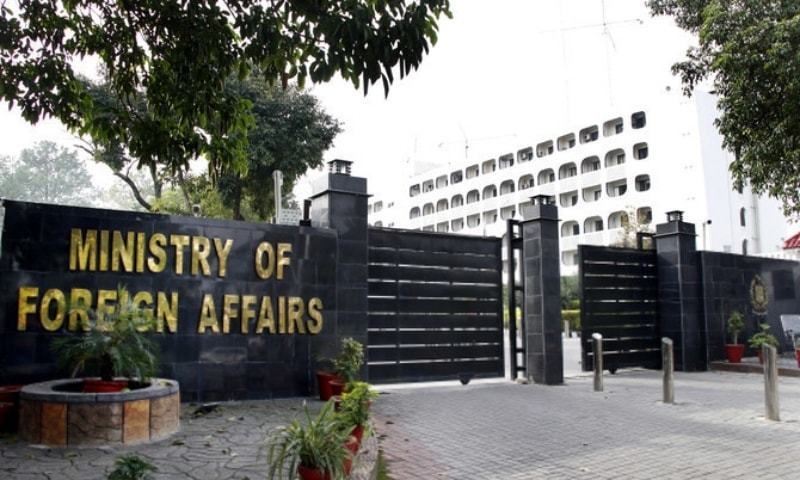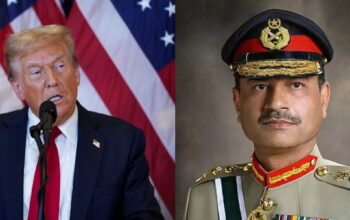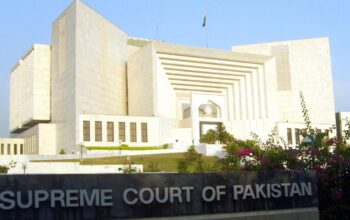By Staff Reporter
ISLAMABAD: Pakistan on Thursday condemned Israel’s ongoing war against Iran, denouncing Tel Aviv’s recent attack as “unjustified and illegitimate” and pressing the international community to step in and hold Israel accountable.
“Pakistan strongly condemns unjustified and illegitimate aggression by Israel against the Islamic Republic of Iran,” the Foreign Office spokesperson Shafqat Ali Khan said at a weekly briefing.
“The Israeli military strikes violate the sovereignty and territorial integrity of the Islamic Republic of Iran and clearly contravene the UN Charter and fundamental principles of international law.”
Khan said Iran has right to self-defense under Article 51 of the UN Charter, adding that the attacks “constitute a grave danger and a serious threat to the peace, security, and stability of the entire region and beyond, with serious implications.”
The statement came just hours after a rare White House luncheon where Pakistan’s army chief, Field Marshal Syed Asim Munir, met with US President Donald Trump, an encounter that stretched beyond its scheduled time.
The meeting thrust the escalating Israel-Iran conflict into the spotlight. Trump, a staunch ally of Israeli Prime Minister Benjamin Netanyahu, reaffirmed his hardline stance that Iran must be prevented from acquiring nuclear weapons. While he offered no specifics about his discussion with Munir, the prolonged engagement signaled the weight of the issues at hand, including the volatile Middle East tensions.
Back in Islamabad, foreign office called on the international community and the United Nations to act decisively, insisting they “bear the responsibility to uphold international law, stop this aggression immediately and hold the aggressor accountable for its actions.”
The spokesperson also drew attention to a joint statement issued earlier this week by 20 countries, Pakistan among them, demanding an immediate end to hostilities in the Middle East.
That declaration went further, spotlighting the need for “a Middle East Zone Free of Nuclear Weapons and Other Weapons of Mass Destruction,” a standard it said must apply universally across the region. It also urged all Middle Eastern nations to sign onto the Nuclear Non-Proliferation Treaty (NPT), a pointed call amid ongoing debates over Iran’s nuclear ambitions and Israel’s undeclared arsenal.
The timing of Pakistan’s statement, hot on the heels of Munir’s White House visit, raised questions about whether the US had pressed Pakistan for some kind of concession.
When asked if Trump had sought a “special favor” during the meeting, Khan brushed off the notion with diplomatic finesse. “Both nations share strong and multifaceted relations with a full agenda of interaction and cooperation,” he said. “So, I don’t know how to characterize or define a special favor.”
Pakistan, Khan added, remains steadfast in its push for diplomacy over conflict. “We have consistently advocated for diplomatic solutions to international conflicts and would support any meaningful initiative in that direction,” he said, signaling Islamabad’s hope for de-escalation even as it stands firm against Israel’s actions.
Later the Foreign Office issued a travel advisory discouraging Pakistani nationals from traveling to Iraq, Lebanon, and Syria, citing the unstable conditions in these countries. The advisory, released Wednesday, warns against such travel “until the situation improves” and calls on Pakistanis already in the region to take heightened precautions.
“All Pakistani nationals residing in these countries are strongly advised to exercise utmost caution, remain vigilant, restrict non-essential movement, and maintain regular contact with the respective embassies of Pakistan,” the advisory read. It also included contact details for Pakistan’s embassies and consulates in the three nations, urging citizens to use these resources for support and updates.
Meanwhile Reuters, quoting the White House announced on Thursday, reported that President Donald Trump will determine within the next two weeks whether the United States will step into the intensifying conflict between Israel and Iran as diplomatic efforts to avert a broader crisis gain momentum.
The statement follows a swirl of speculation about the president’s intentions, sparked by a Wall Street Journal report asserting that Trump had privately greenlit military attack plans targeting Iran but held off on final approval, betting that Tehran might abandon its nuclear ambitions.
Trump pushed back hard against the story, taking to his social media platform, Truth Social, to declare, “The Wall Street Journal has No Idea what my thoughts are concerning Iran!”
On Wednesday, Trump offered a more measured response when pressed by reporters about the prospect of authorizing a strike. “We’ll see what happens. I’ve been asked about it by everybody, but I haven’t made a decision,” he said, according to Al Jazeera.
“Based on the fact that there’s a substantial chance of negotiations that may or may not take place with Iran in the near future, I will make my decision whether or not to go within the next two weeks,” press secretary Karoline Leavitt quoted President Trump as saying .
Israel on Thursday bombed nuclear targets in Iran and the Tehran fired missiles and drones at Israel after hitting an Israeli hospital overnight, as a week-old air war escalated with no sign yet of an exit strategy from either side.
Behind closed doors, diplomatic channels are busy. Three diplomats, speaking to Reuters on condition of anonymity, confirmed that US special envoy Steve Witkoff and Iranian Foreign Minister Abbas Araqchi have held several phone conversations since Israel launched its military strikes on Iran last week.
Copyright © 2021 Independent Pakistan | All rights reserved




